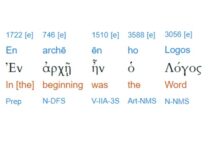 We’ll start with a definition of Penal Substitutionary Atonement (PSA) so that everyone is on the same page. You almost certainly know the doctrine, even if you don’t know the name.
We’ll start with a definition of Penal Substitutionary Atonement (PSA) so that everyone is on the same page. You almost certainly know the doctrine, even if you don’t know the name.
According to PSA, Jesus suffered the wrath of God by suffering the punishment for sins as a substitute for us instead of us taking that punishment ourselves, and as a result, we have Jesus’s righteousness credited to us and thus are restored to right relationship with God.
It breaks down thusly:
- Penal. This word refers to punishment, specifically saying that Jesus was punished on the cross.
- Substitutionary. This word indicates that Christ was punished “in our place” and “instead of us” as our substitute.
- Atonement. This word is generally understood to mean a restoration of “right relationship”, meaning that according to PSA, Jesus’s penal substitution restores us to right relationship with God.
Now, many Christians might say “Isn’t that just the Gospel?” And the answer is yes… according to some Christians, but definitely not all. Arguably the oldest Christian denomination in the world — the Eastern Orthodox Church (off of which the Roman Catholic Church split because the Orthodox wouldn’t recognize the Pope) — rejects PSA, and others do as well.
This article series on PSA will be a thorough Biblical examination of the doctrine to see if it aligns with scripture.
Why?
Because while doing my daily Bible reading some time ago, I ran across a passage that seemed to make PSA impossible. (Ezekiel chapter 18, which we’ll cover later in the series.) I was taught PSA since childhood and only learned that a biblical case against it existed when I started investigating after reading that chapter that day.
To be 100% upfront, I’m still not entirely sure where I will land. I’m currently leaning in one direction, but I’m not ready to “plant my doctrinal flag” either way as I write this series intro. No man is unbiased, but I’ll try my best to keep my bias out of this article series. (And I invite readers to call me out on any bias that they see in the comments.)
Like in a debate, this article series will present the arguments both for AND against PSA.
This article series is partially my research notes, documenting the strongest arguments both for and against it. I’ll present the arguments from both sides and you — like in a debate — can decide which side is more compelling. Regardless of whether you’re a firm believer in PSA, uncertain about it, or ardently against it, you’ll be far more familiar with both sides of the debate by the end of this series.
I will do my very best to accurately and fairly represent both sides of the debate. There will be no “straw man” tactics, nor emotional rhetoric, and the sole arbiter will be the scriptures themselves. We will look at other things (like the Early Church Fathers for historical context), but scripture alone is the sole arbiter of Christian faith and doctrine.
So please, settle in, put on your thinking cap, and maybe make yourself a nice cup of tea because this series won’t be a short read. (This intro is pretty short though.)
We’ll start with an overview of the core tenets of PSA.
The Core Tenets of Penal Substitutionary Atonement (PSA)
The full doctrine of PSA actually comprises 17 different points. (You can look at them in this YouTube video series by some Eastern Orthodox Christians. Do be aware that they — like all Eastern Orthodox Christians — strongly oppose PSA. And please don’t take the link as an endorsement; I just don’t know another source that goes through all 17 points.)
However, you can distill its core essentials down to far fewer points. Not everyone holds to the full 17, and I would argue that most modern Christians don’t. Thus, we’ll only look at the absolutely essential parts of PSA.
If you remove a single one of the following parts, you no longer have PSA.
Note: I came up with this grouping of PSA’s core tenets. There are probably other ways to group them, but this made the most sense to me and followed Einstein’s principle that: “Everything should be made as simple as possible, but not simpler.”
Here are the core tenets of PSA:
- The sin of man deserves God’s righteous, just, and holy wrath.
- Because God is perfectly righteous, just, and holy, He cannot simply leave sin unpunished, even if the sinner repents; to remain true to His own holy character, He must punish sin.
- It is acceptable for God to punish an innocent substitute instead of the man guilty of sin, provided that all three of the following conditions are met:
- The substitute is of the same nature as the guilty. (which is why animals won’t do)
- The substitute is 100% righteous with no sin whatsoever. (Otherwise his own sin would need to be punished)
- The substitute is voluntary.
- Once the substitution has been made, the righteousness of the righteous substitute is transferred to the sinner, and the sinner’s wickedness (or sins) are transferred to the innocent substitute. (called “imputation”, and when it goes both ways, it’s called “double imputation”.)
This leads us right back to the definition that opened this article.
According to PSA, Jesus suffered the wrath of God by suffering the punishment for sins as a substitute for us instead of us taking that punishment ourselves, and as a result, we have Jesus’s righteousness credited to us and thus are restored to right relationship with God.
Theopedia defines PSA this way:
Penal substitutionary atonement refers to the doctrine that Christ died on the cross as a substitute for sinners. God imputed the guilt of our sins to Christ, and he, in our place, bore the punishment that we deserve. This was a full payment for sins, which satisfied both the wrath and the righteousness of God, so that He could forgive sinners without compromising His own holy standard.
Again, the core elements of PSA can be distilled into the 4 core tenets above, and we’ll examine them in detail in this series. Some of the verses/passages that touch on PSA won’t be covered in our examination of the core tenets. We will look at those verses/passages after examining the core tenets.
In order to give you an idea of what to expect, here’s an overview of what the series will cover.
Series Overview
The current outline for the series is below, but as with all works in progress, it’s subject to change. I might change/add/combine any of these depending space and relevance. I probably won’t write/publish them in this order.
- Series Intro: what you’re reading now. Following this intro, there will be one article covering each of the core tenets of PSA
- PSA’s core tenet #1. This article is finished and you can find it here.
- PSA’s core tenet #2. A thorough examination of it. You can read this article here.
- What is “Atonement”? This will be a thorough look at “atonement” and what it means. You can read this article here.
- The Day of Atonement and Old Testament sin offerings. We will look at both in the same article, since the Day of Atonement includes a sin offering. You can read this article here.
- What is “Propitiation”? Like the article on “atonement” we’ll take a thorough look at the word and what it means.
- What do “Redemption” and “Ransom” mean? These terms are used in some of the strongest passages used to support PSA. Thus, we’ll take a close look at them.
- What is “Atonement”? This will be a thorough look at “atonement” and what it means. You can read this article here.
- PSA’s core tenet #3. A thorough examination of it.
- PSA’s core tenet #4. A thorough examination of it.
- Article(s) looking at the strongest PSA verses/passages. The verses/passages on the list so far are below. The list below is in no particular order, and I likely won’t write/publish them in the order below.
- Isaiah 53: This will likely be split into several articles since there’s a lot to cover. In fact, one of them has already been published, sort of.
- Isaiah 53:6 “laid on Him the iniquities of us all”: This material was covered in my article: How To Do a Word Study of a Greek or Hebrew Word in the Bible.
- 1 Peter 3:18: For Christ also died for sins once for all, the just for the unjust, so that He might bring us to God, having been put to death in the flesh, but made alive in the spirit
- 2 Corinthians 5:21: He made Him who knew no sin to be sin on our behalf, so that we might become the righteousness of God in Him.
- Galatians 3:13: “Christ redeemed us from the curse of the Law, having become a curse for us—for it is written, “CURSED IS EVERYONE WHO HANGS ON A TREE”
- Romans 8:3: “ For what the Law could not do, weak as it was through the flesh, God did: sending His own Son in the likeness of sinful flesh and as an offering for sin, He condemned sin in the flesh,”
- Romans 3:25: “whom God displayed publicly as a propitiation in His blood through faith. This was to demonstrate His righteousness, because in the forbearance of God He passed over the sins previously committed;”
- Hebrews 9:28: “so Christ also, having been offered once to bear the sins of many, will appear a second time for salvation without reference to sin, to those who eagerly await Him.”
- 1 Peter 2:24: “He Himself bore our sins in his body on the cross, so that we might die to sins and live for righteousness; for by his wounds you have been healed.”
- 1 John 2:2: “He is the atoning sacrifice for our sins, and not only for ours but also for the sins of the whole world.”
- The whole of Hebrews chapters 8-10. I hope to get it all in one article after giving all the context in previous articles, but we’ll see. This might need to be more than one article.
- Other verses? If you can think of a verse/passage that strongly supports PSA that isn’t on this list, please say something in the comments.
- Isaiah 53: This will likely be split into several articles since there’s a lot to cover. In fact, one of them has already been published, sort of.
- Article(s) on the Early Church fathers’ views of Jesus’s work on the cross. The PSA school says that PSA was taught from the beginning, but the anti-PSA crowd says it was created by Calvin during the Reformation. I’ve been reading the original sources — the early church fathers themselves — and making notes as I read. I’ll report what I find.
- Article(s) looking at the strongest anti-PSA verses/passages/objections. Many of these will be covered in other places, but there are a few that might fit here.
- Trinitarian objections. We’ll look at some objections that PSA breaks the Trinity in this article. (Example: “If Jesus is God, and God “poured out His wrath on Jesus”, then did God pour out His wrath on Himself”)
- Ezekiel chapter 18. Effectively the whole chapter, but especially verses 20-22.
- 1 Cor 15:14: And if the Anointed hasn’t been raised, then our preaching is worthless and your faith is worthless.
- Other verses? If you can think of a verse/passage that strongly argues against PSA that isn’t on this list, please say something in the comments.
I’ll update this article with links as I publish each article in the series.
Until then, I recommend you read my article: How To Do a Word Study of a Greek or Hebrew Word in the Bible. Not only does this article look at an important passage in the debate (Isaiah 53:6), but it will also show you how to double-check my analysis of original language words, and enable you to do such analysis yourself.
You can read the next part of this series here: PSA Series – Does Man’s Sin Deserve God’s Wrath? What is God’s Wrath?
God Bless, and I’ll see you in another article soon.




Thank you so much for broaching this subject. I find that I am aligned with your position(s) on most of the material presented on this wonderful site. I just started reading Eitan Bar’s “The Gospel of Divine Abuse” recently, and it has made me rethink some of my positions on this issue. I look forward to more of your research on this matter. Obviously as you rightly pointed out, scripture ALONE should be our guide, but I thank GOD for you as I believe he has been personally teaching me these last twelve years using individuals he brings into my life such as yourself. You are truly a blessing. Please keep up the great work. Your reward in the kingdom will be great.
-A fellow Berean and servant of YHWH-
You’re welcome, and thank you for the kind words. 🙂
I know I’m out of topic but can you please explain to me Deutoromy 3 vs 26 why Moses said God was angry at him for Israelites sake? Why he blamed Israel for his sin of disobeying God in Numbers 20 story?
It’s actually somewhat on topic if you think God is angry with one man for another man’s sin. 🙂 I’m not sure which translation you’re reading, but this idea of “on account of” in Deut 3:26 can have a different connotation in Hebrew than English. Here’s Thayer’s definition 1.b.
God was Angry with Moses because in Numbers 20, Moses struck the rock when God commanded him to speak to it. I think the following phrase in Numbers 20:12 is revealing here.
God was angrier with Moses because not only did Moses disobey, but he disobeyed God in front of Israel. This is the difference between a second-in-command (or ambassador) disobeying the leader in private behind closed doors, and directly defying him in public in front of everyone. Both are bad, but the latter one is far more serious. Thus “on account of Israel” means “on account of you doing this in front of Israel”, not because of Israel. (See the lexicon quote above)
That seems to fit all the facts and eliminates any potential issues.
Wow thank you
You’re welcome. 🙂
Which bible school did you attend because I see you’re good in interpreting old testament?
That wasn’t something I learned at Bible college. My father started teaching me how to study the Bible in my early teens, and I had a great example in the pastor of the church I grew up in. Honestly, the contents of my articles The Biggest Mistakes Most People Make When Studying the Bible and How To Do a Word Study of a Greek or Hebrew Word in the Bible are an immense part of how I do what I do. Maybe someday I’ll write an article on my process for research/writing articles. That might also be helpful.
In Eden, we left spiritual dependence, but we still need His Spirit. (A spirit is an unseen reality.) So God shares His Spirit with believers. In this spiritual relationship: We take the role of Christ’s body, and Jesus takes the role of Head toward God. We bring sin into this relationship. But He filters it out, because the Head knows better. How? Whatever Jesus bears outside of His control is God’s responsibility. The Head of us doesn’t intend to do those sins of His body. Therefore, He would not offer to God those sins. Therefore, God doesn’t count those sins. (It’s not sin- unless it’s against God.)
Then what happens to the sin? It falls into His death outlet. Even beyond the death outlet and into the spiritual realm, God doesn’t ultimately have to count sin, because He owns all. This means that neither the body nor the responsible Head would suffer the spiritual realm’s curse for those sins as God is happy without frustration. However, in the physical realm, He must die.
That’s what we’re zooming into here. He dies under the physical curse. Sin is intertwined with the physical curse (for our hope.) The physical curse is what we all experience through life, especially at the end. Spiritually blind people, or even animals manipulate this curse. (But not too much since it’s pinned by the spiritual realm.) I mean, we can punish the wrong person, or else save lives with air bags. This physical realm then, give us time to repent, and gives Jesus a chance to die- so to speak. If we die in our own sins, we’d have to go to hell, that is, the spiritual curse. I hope that’s clear.
Now, I’ll use different aspects to show the same thing: Thorns were part of Adam’s curse. Christ’s Head took thorns, although He was nailed by the body’s limbs. Ok, this next one is interesting: The hand is put over the Head of the sin offering. We are His hands, you remember, our sins are laid on His Head. From that point, two things happen. The goat representing sin, is taken out. The other is offered to God. So we see, what I call filtration. He is not offering our sins to God, but filtering them out. So our sins end, nailed at the cross; while He goes on to offers HimSelf to God Spiritually. You know the story, He gives up His Spirit to God after death to distribute to those who assent to His invitation.
I have something maybe more interesting now. 2 Cor 5:21 “For he hath made him to be sin over us,” (the Greek word here is hyper, meaning over… like Head.) Then it say, ” who knew no sin;” (obviously, the perfect One to Mediate.) Then it says, “that we might be made the righteousness of God in him.” We are God’s righteousness in this world, His hands, His body. God works through us. This verse shows Him being our spiritual Head, meaning He is our way of sinning, that sounds strange. But it’s so interesting, that He is the filter through which we must do all of our sins. Again, we’re His hands to do good, He’s our Head to choose bad- but He doesn’t. He doesn’t offer our shared sins to God, for God to count. (That would be a bad Head.)
We’re stuck in two important ways. 1. God doesn’t consider us family without the family Spirit. And not being family, He refuses to like anything we do. And at the same time 2. we do things that He doesn’t like, which do not encourage Him to bring us into His family. These two reasons play off each other, rendering us helpless.
Anything that God’s people steal, He can give them for free. It’s unexplainable Grace. And if they give it back, He’ll reward them. But the only way to join His family and receive such a benefit is to go through the gate of forgiveness. Now, forgiving would be the same as giving. But for-given means that you’re given something that you already stole. Basically, He turns what you stole, into a donation. (Besides, He knew that you’d do it.) Of course, He has more for anyone than they could steal, but some reject Him anyway. Giving those sins afore, by bearing them in His flesh- that’s actually forgiveness.
It’s God’s honor to give, as well as forgive, to the helpless. Forgiveness makes him valuable to us. And it’s valuable for Him to get us. He cut off from HimSelf, what that you stole. When He FOR-Gave He didn’t cut off His glory, He revealed it by having more. He glorified His Unique Eternal Spring which we receive. No one pays God to turn the cheek; He want to be exemplary. It’s our job to be undeserving. Let us then, do the same, and cut off those sins for reward.
I didn’t understand all of this, and disagreed with much of what I did understand. Also, you’re entirely incorrect about the Greek of 2 Cor 5:21. The Greek word there is “ὑπὲρ” (huper, pronounced “hoop-er”) and — in this context — it means “for the benefit of”, not “over”. (See Thayer’s definition # in the link)
I have noticed whenever the Greek and Hebrew words that mean to carry or take away are translated as bear or bore when it comes to description of Jesus and his relationship to sin.
However it is interesting to note that in Matthew chapter 8 and 9 it is listing all of the diseases and afflictions and maladies that people had (blindness, lameness, leprosy, demons, withered hand, and other ailments). And it says that Jesus healed them of their diseases and ailments but he did not become blind himself or become leprouss himself or become paralyzed himself, he took those things away then at the end of chapter 9 It quotes Isaiah where it says he bore our diseases and carried our infirmities. But those words mean to carry away or take away they don’t mean to take into oneself as it has come to be interpreted.
So when it says that Jesus bore our sins it means he carried them away, and took them away, not that he became guilty of them himself just like he never actually became diseased with the things that he healed.
I have a more in depth article about this on my website
Bit.ly/findagooduse
I’ll be covering much of that “carry away” issue in the upcoming article on the Day of Atonement. There’s even more to it than you mentioned, so stay tuned. 🙂